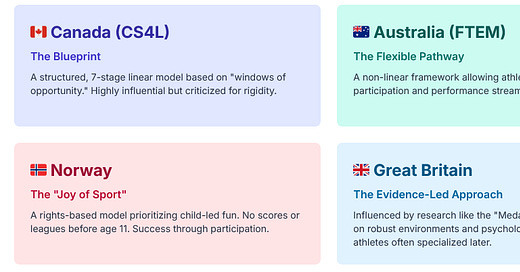The Athlete's Odyssey
A data-driven journey through the science and philosophy of Long-Term Athlete Development, from ancient origins to modern best practices.
From Warrior to World-Class: The Evolution of Development
The concept of systematically developing human potential is not new. It's an ancient idea refined by centuries of practice and modern science. Before we had "LTAD," societies were already building long-term pathways to create their ideal citizens, whether they were Spartan warriors or Soviet champions. Understanding this history reveals the core principles that still guide us today.
A Global Snapshot: Six Models, Six Philosophies
While the Canadian LTAD model provided the blueprint, nations worldwide have adapted it to fit their unique cultures. There is no single "correct" way, but comparing these approaches reveals a global shift towards flexibility, enjoyment, and a more holistic view of athlete development.
The Modern Athlete Journey: A Non-Linear Path
Successful development isn't a straight line. Inspired by Australia's FTEM and Côté's DMSP, this modern pathway emphasizes flexibility. Athletes sample, specialize, and invest at their own pace, with opportunities to move between high-performance and recreational sport, ensuring lifelong engagement and preventing burnout.
The Specialization Conundrum: Risks vs. Rewards
The pressure to specialize early is one of the most contentious issues in youth sports. While the culture often pushes for a "win-now" approach, the scientific consensus is clear: for most athletes, specializing too early increases risks and can limit long-term potential.
Pillars of Modern Development: The Scientific Consensus
Global authorities like the IOC and NSCA have established a clear, evidence-based consensus for youth athletic development. An ideal program is not defined by a single model but by its adherence to these core principles, which prioritize the holistic development and long-term health of the athlete.
Building the Whole Athlete: The Power of the Mind
An athlete's journey is defined as much by their mind as their body. Modern development programs recognize that psychosocial skills are not optional add-ons; they are performance-enhancing assets. Fostering the "4 Cs" is critical for creating resilient, motivated, and confident individuals both in and out of sport.
Patience to Podium: An LTAD Case Study
Global success is rarely an accident; it's the result of a long-term vision. Singapore's first-ever Olympic gold medal in swimming in 2016 was not a one-off miracle, but the culmination of a systematic, patient application of LTAD principles that began over a decade earlier.
A Blueprint for Success
The evidence is clear. Building a successful and sustainable sports program requires a culture shift. We must move away from a "win-at-all-costs" mentality and embrace a patient, holistic, and health-first approach. The most critical investments are not in early specialization, but in the education of coaches and parents, who are the true architects of the athlete's environment.










